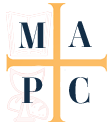Bev’s Sabbatical Blog - Week XI
November 1 - 7
Learning to Stop Walking | November 4
If you are a friend or family member or connected with me on FB, then you know I had to stop walking almost a week ago. Last Saturday (was it Saturday? I think so), I made the climb up to O Cebreiro, the highest elevation I had to tackle since the Pyrenees. It rained all day. And it had rained all the previous day. The path was very wet and muddy, and it times it was like walking up a very shallow stream. I made it just fine. Then, when I got to O Cebreiro, I fell down the two wet stone steps into the restaurant of the hotel where I was staying and sprained my ankle. On the one hand, I am glad I did not fall on a remote path and have to be rescued because I couldn’t walk to the nearest village. On the other hand, it seems the height of irony to have walked for almost two months, with all the rocky, tricky ascents and descents I had, and then fall on the steps going into the restaurant. I knew at the time it was probably a Camino-ending injury, but at first I hoped I might be able to start walking again after a couple days rest. The staff behind the bar supplied me with ice that evening and the next morning, and called me a taxi to take me to the nearest medical clinic 4 km away. They examined my ankle and knee, which I also wrenched, saw no sign of a fracture, gave me an anti-inflammatory injection and told me I could start walking again in an hour and a half. I knew better. The same taxi took me to my next destination—Triacastela—where I already had a room booked for the night at Casa Simon. If you are a planning a walk, please consider staying at Casa Simon when you get to Triacastela—it’s a pension rather than an albergue, but if you would like a lovely single room in a beautiful space with welcoming hosts, I highly recommend it. They were so kind. I ended up staying two nights while I figured out what to do, and while I was there I saw an amazing physiotherapist who worked on my foot, ankle, knee and leg for an hour and a half. I am convinced that the reason I am healing more quickly than I would have thought is because of all the work she did. She also confirmed that it was indeed a serious sprain and I could not continue walking.
To say I was disappointed is an understatement. Though I already knew that and had accepted it, I burst into tears when she confirmed it. But, onward. Ultreia and suseia as they say on the Camino—which roughly translates to onward and upward, or further and higher. It usually refers to continuing to walk, but in my case, it meant onward to plan B. I just had to figure out what plan B was. I knew I needed to rest my ankle and knee so that when I flew to Paris on 11 November I would be able to walk around the city. My close friend of forty years, who is like my sister, is joining me in Paris for ten days before I return home for Thanksgiving. I did not want to be in Paris for ten days unable to move around the city.
I decided what I needed was a week at the ocean. I have always found the ocean to be the most restorative place —especially rocky coastline—so I started researching Air BnBs in Finisterre and Muxia, and found this beautiful place with this spectacular view of the water and the mountain across the bay. Finisterre is where many people end their pilgrimage. As its name says, it is the “end of the earth”, the farthest west you can go in this part of Spain. I haven’t walked to the lighthouse yet, where pilgrims end their pilgrimage if they go beyond Santiago. But I hope to be able to do that before I leave. I have been walking down the hill to the village each day, and that’s probably enough for now. But there is an old fort/castle in the village, right on the water, and below it are rocks with crashing waves. Perfect.
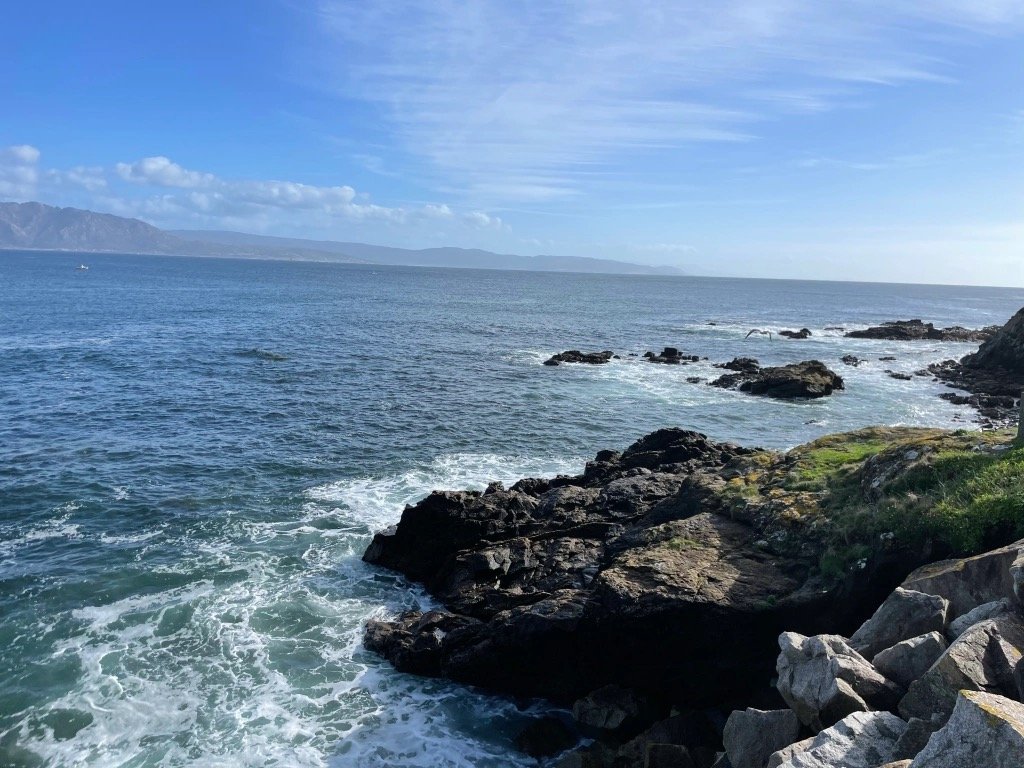
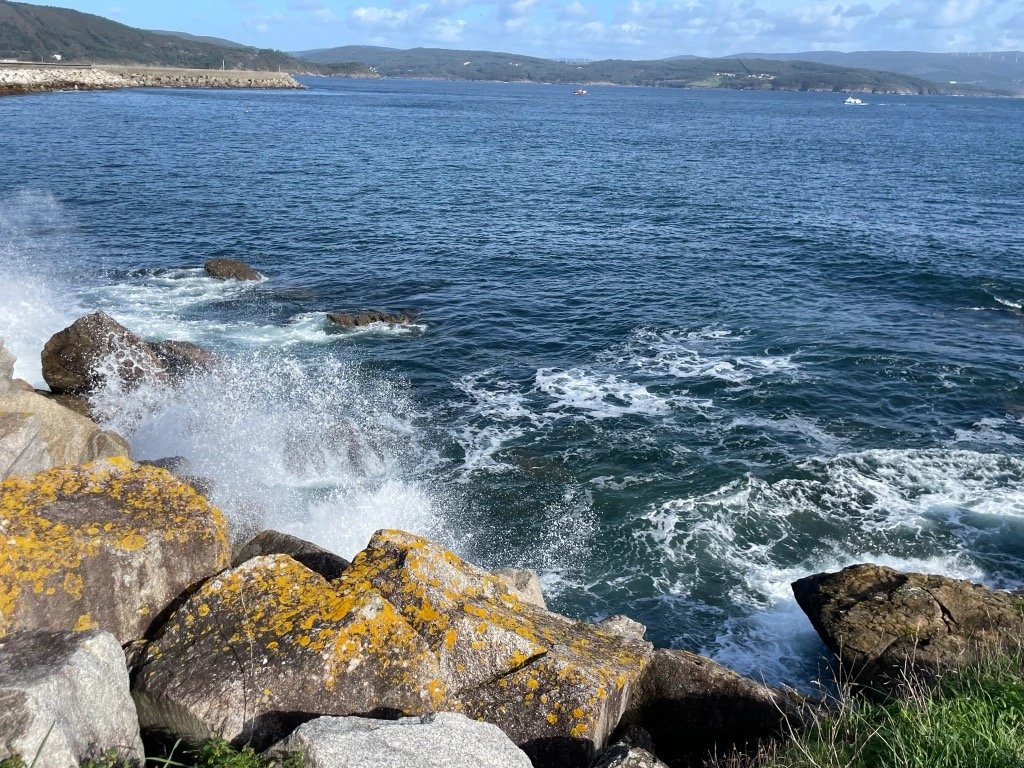
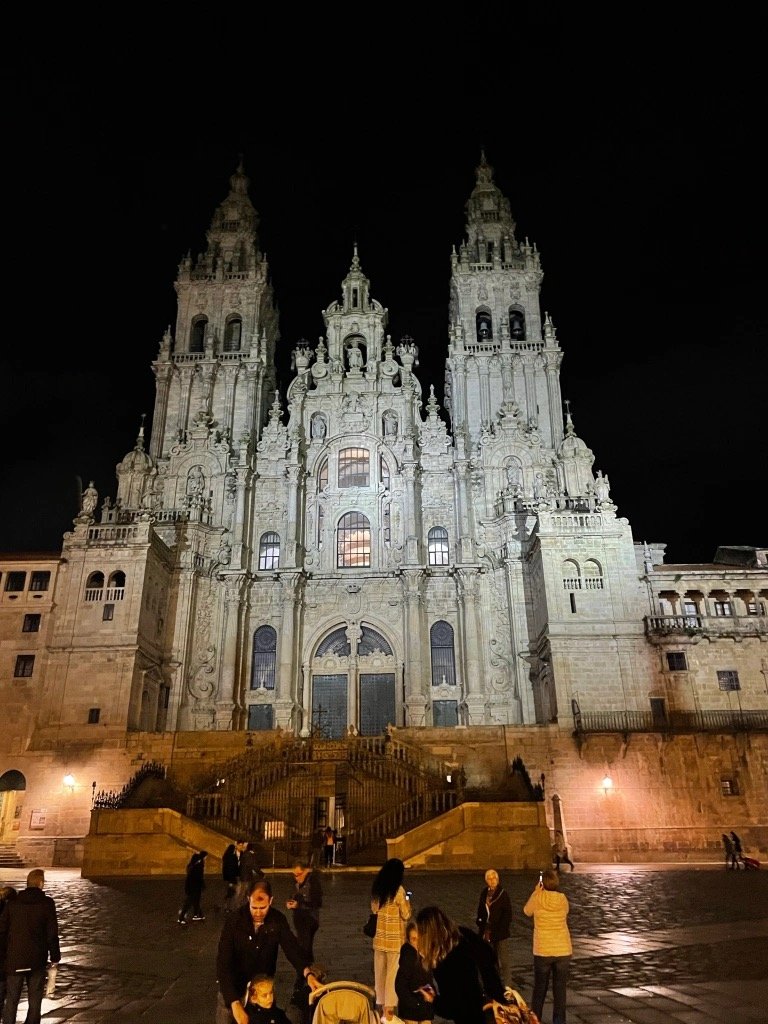
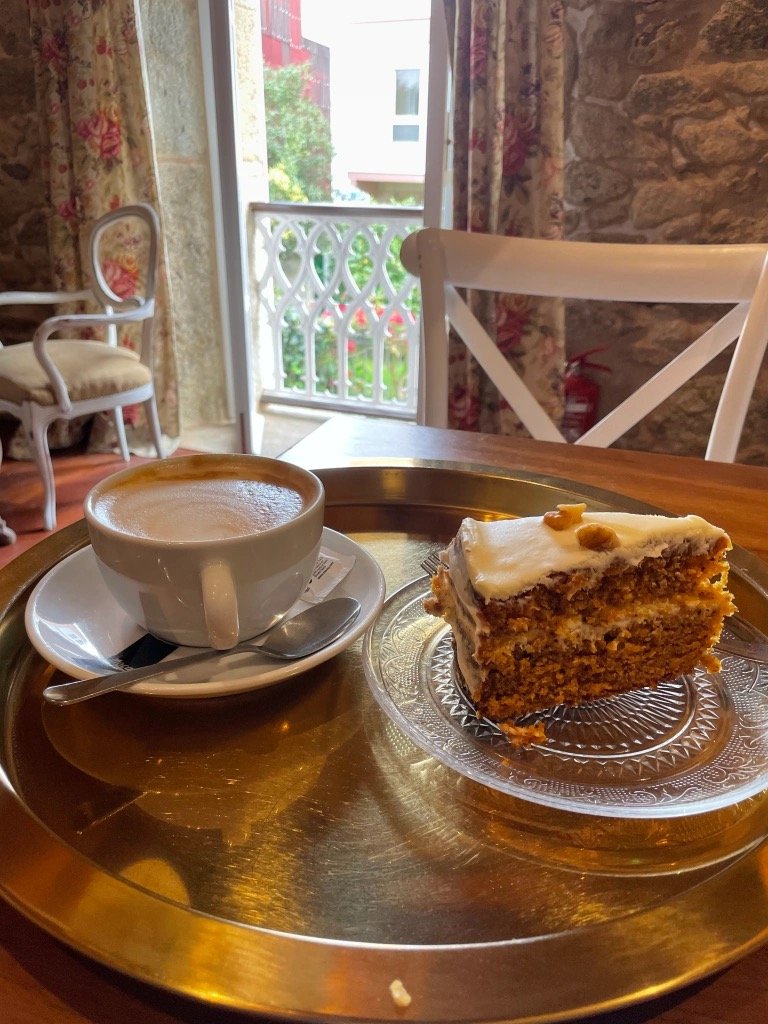
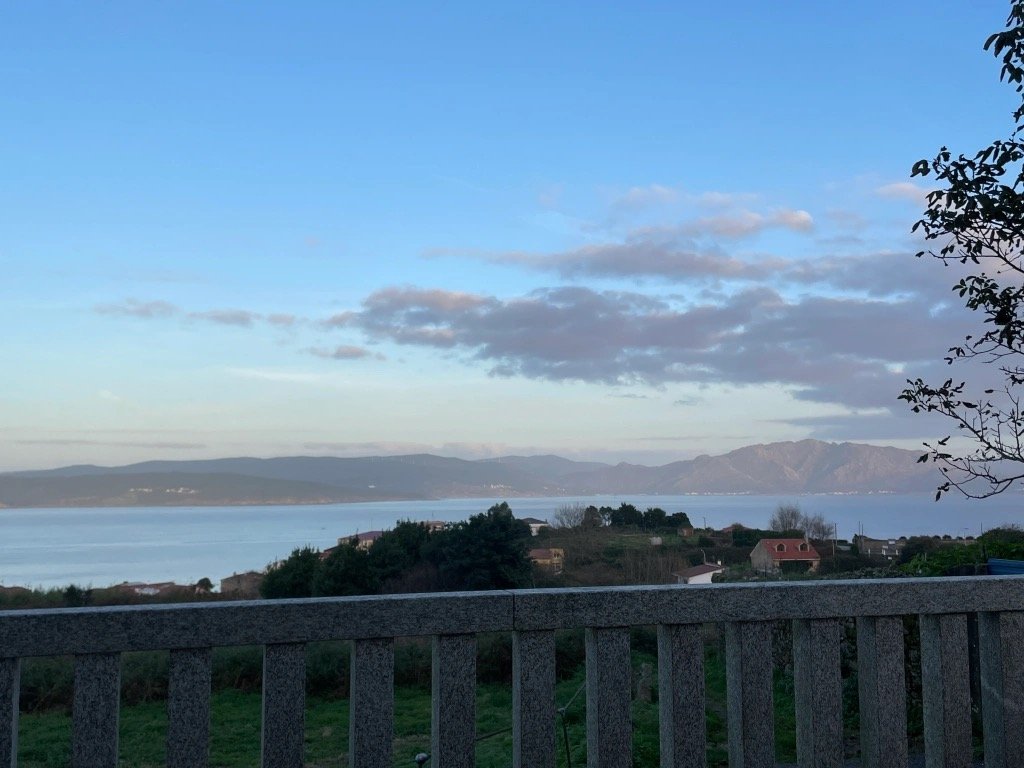
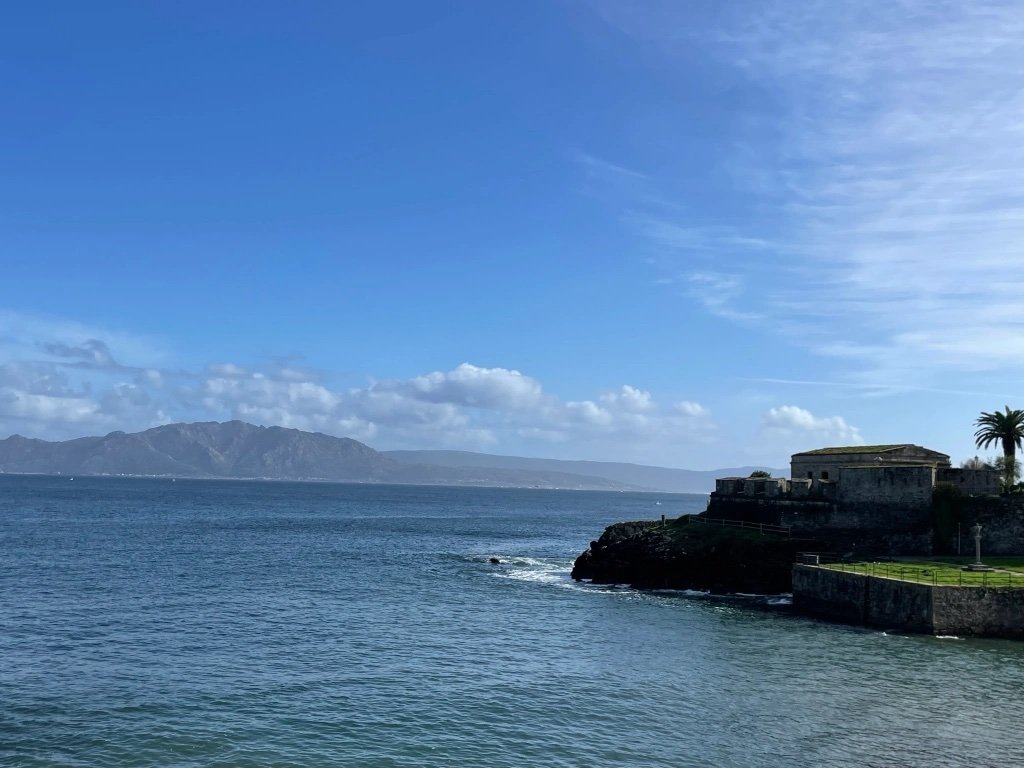
I took a bus from Triacastelo to Santiago on Tuesday. It felt very strange to be entering Santiago de Compostela by bus rather than on foot. I went to the square to see the Cathedral, since I stayed in the former monastery that is right there. I decided that even if I cannot get the Compostela—the beautiful certificate that says you completed the pilgrimage, I have earned the photo in front of the Cathedral since I walked across France and part of Spain. I don’t like the one I took last Tuesday, so I’ll get a better one when I return on Wednesday. When I learned that my friend Amanda from Canada, who I met in the first week in France, and who has been on a similar schedule as me, including foot injuries, was also looking at places to stay in Finisterre, since she also had to quit walking, we decided to combine forces and she has been here the past couple of days. She will leave tomorrow, and I will have a few days on my own, reading, writing, reflecting, staring at the water, and healing. And enjoying this amazing, charming German bakery. I can’t promise how much blogging I will do the next few days. There is wifi, but not the best, and it takes forever for photos to upload to WordPress. But I’ll try to catch up a bit. I am grateful to all of you for following along and for your words of encouragement. Several people have suggested I write a book. I’m not sure the world needs yet another book about the Camino. But I do want to do some writing of some kind. Maybe just more blogging. If I’m going to continue this in some form, I should probably learn more about what I’m doing. Tech stuff is not my forte.
We are going to walk up the hill to see the sunset on the other side of this peninsula. Don’t worry. It’s a short walk. Shorter than the walk down the hill into town.
Learning to Walk (Through Life) | November 7
Someone whose blog or social media posts I follow, some wise person, recently wrote about Tennessee Williams’ line, “I have always depended on the kindness of strangers”, in A Streetcar Named Desire, saying something to the effect that it is a shame this line was spoken by a character, Blanche DuBois, who was incapable of managing life at all and thus the line has a negative connotation. I am sorry I cannot remember whose post I was reading that got me thinking about this, and cannot give them credit. My deepest apologies to you, whoever you may be.
The truth is, we all depend on the kindness of strangers. If strangers were not kind to each other, didn’t help each other out, this world would be a much harder, more unpleasant, downright miserable place to be. Much more so than it currently is. This truth is one of the things that has become more evident to me as I undertook this solo adventure to walk across large swathes of France and Spain over the last two and half months. Along the way, strangers have interpreted for me, helped me find doctors and medical care, given me directions, said, “Bon, courage!”, when the day was getting long and the path was challenging and I seemed to be moving painfully, or painfully slowly. Strangers have gotten me ice and ice packs for my feet and ankle; stopped, unbidden, to make sure I knew I had missed a turn and was not at all on the path, stopped to help me figure out which way the path went when the markings weren’t clear; strangers have welcomed me into their homes turned into gites (pilgrim accommodations in France) and fed me multi-course, home-cooked French meals. The lovely couple who own the Air Bnb I am in left me a brand new ice pack and even left crutches should I need them. They brought my friend Amanda and I small gifts to take with us, and have checked to make sure I was okay over this week. Strangers have smiled and said Bon Chemin/Buen Camino over and over and over again. I’m not sure pilgrims would make it very far without the support and help of strangers. We depend upon their kindness.
Several weeks ago, I was talking with someone, a stranger who either was sharing my table or staying in the same gite, about NYC. They were talking about how very helpful they found New Yorkers, commenting on how the stereotype of rude New Yorkers is undeserved. They said whenever they needed help or directions in the city, New Yorkers always stopped to help them. If they had their map out, someone would always stop and ask if they needed help finding something. I agreed that I had found the same thing in all my years of living in the city. New Yorkers may not always look you in the eye, smile or say hello, but if you needed something or were in trouble they were right there to help you.
When I fell and sprained my ankle I had to deal with it on my own since I was not traveling with anyone. I admit, it would have been nice to have company at that point. But I wasn’t really alone. The staff behind the bar of the restaurant downstairs gave me ice whenever I asked for it. They called the emergency clinic for me on Sunday morning to ask if they were open and would see me. They called a taxi for me. The clinic evaluated me, gave me an anti-inflammatory injection and charged me nothing (thank you taxpayers of Spain), the same taxi driver returned to take me to the next town. My hosts there provided an ice pack and got it for me whenever I asked for it, invited me to join them for their family lunch the second day I was there, made an appointment for me at the physiotherapist (who worked on my foot, ankle and knee for an hour and a half and charged me all of 30 Euros. Again, thank you Spanish tax payers.) And a friend I made while crossing the Pyrenees, part of the “Camino family” that was together for just four days but became fast friends, offered to leave her Camino and come help me if I needed her. If I had broken my ankle and was unable to walk at all, I probably would have accepted her offer. I knew it was sincere.
One of the learnings of this time is not just that we all depend on the kindness of strangers, but that most of us (perhaps true narcissists are the exception) want, even need, to offer that kindness. And, I don’t know that much about narcissists/narcissism, but I guess if showing kindness fed their self-image, even they would have a need to show kindness! Humanity is a big web; we are woven together. That is hard to see sometimes because we are so fractured and divided politically. But even when we are on polar opposite sides of an issue, you can often still see this deepest impulse to respond to each other when we are in need—remember the story of opposing protestors stopping to help a man who had a heart attack or had collapsed for some reason?
That is something I want to hold on to from this sabbatical time. How everyone supported each other, how total strangers were eager to help, how everyone recognized that we are all on the same path—whether we are walking or providing hospitality and support for those who are walking. We are all pilgrims learning to walk through life, helping each other on the way, walking each other home, as Ram Dass said.

